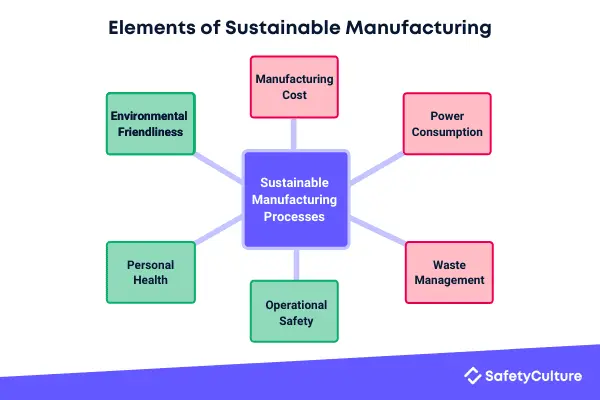What is Sustainable Manufacturing?
Sustainable manufacturing is the strategic method of creating products through economical means and using components that minimize waste and reduce negative environmental impact.
Sustainable manufacturing can contribute to the ultimate goal of sustainable development which, according to the World Commission on Environment and Development, is to “meet the needs of the present, without compromising the capability of future generations to meet theirs.”
Over the years, a growing number of companies have recognized the role of sustainability in increasing their growth and global competitiveness. According to KPMG’s Survey of Sustainability Reporting in 2020, 80 percent of the world’s leading companies are now incorporating sustainability into their operations and goals.
Organizations are implementing various strategies in making their business environmentally efficient, socially sufficient, and economically viable.
The United Nations Climate Change Conference also released a recent study which reveals that sustainability is becoming a basis for purchasing decisions and that more than a third of global consumers are willing to pay more for products that are environmentally-friendly and sustainable.
Elements of Sustainable Manufacturing
Assessing if a manufacturing system is sustainable may vary depending on the business and product, but below are the elements that are mainly used to evaluate this:

Elements of Sustainable Manufacturing
- Manufacturing cost – or the amount used to manufacture the product;
- Power consumption – the amount of energy used to produce;
- Waste management – how the waste is disposed, re-used, or recycled;
- Operational safety – how it ensures the safety of production process;
- Personnel health – how it ensures that workers in the operations aren’t at risk;
- Environmental friendliness – how it ensures that the product is not environmentally harmful.
Challenges in Achieving Sustainable Manufacturing
Though companies have already started to recognize the impact of sustainability initiatives on consumer behavior and their role in solidifying the brand’s image and reputation, there are still numerous barriers in practicing and achieving them.
Lack of standardized metrics or performance benchmarks. Some companies that do engage in sustainable manufacturing have poor systems for monitoring and evaluating the performance of their initiatives, which can lead to inefficiency and inaccuracy in tracking their development.
Cost is too high/lack of funding for green projects. Businesses tend to be skeptical about sustainable manufacturing because of the initial high cost that it entails and the longer duration needed for profit.
Lack of sustainability concepts, locally-conducted programs awareness, and innovation. Access to sustainability-oriented research and programs is essential in implementing sustainable manufacturing practices as more information and support broadens the ideas and the capabilities of companies to achieve them.
Lack of consumer awareness for green projects. An article from the College International pour la Recherche en Productique (CIRP) has also identified this as one of the barriers to fully benefit from the practice of sustainability. According to industry professionals in the manufacturing sector that are one of the respondents of this study, companies should properly address this, considering that there’s already a high demand for green products and green practices from the market.
In conclusion, companies must develop a streamlined process and framework for implementing sustainable manufacturing practices, and develop models that would directly tackle these challenges.
Best Practices
More and more enterprises are engaging in sustainable manufacturing and they have various ways of measuring its level of success and efficiency. Below are just some of the best practices companies can follow when observing sustainability:
- Reduce inputs in production – Find alternatives for supplies that are either harmful to the environment or require a huge amount of materials. Reevaluate processes to identify if there are more opportunities for waste reduction.
- Reevaluate the use of fossil fuels – According to a report released by The Rhodium Group, US greenhouse gas emissions rose again in 2021 and one of the major contributors is energy and industrial production. Decreasing energy consumption not only reduces carbon emissions, but also cuts energy costs.
- Improve efficiency in facility – Modifications in operations can also reduce excess waste and help in identifying more efficient processes in production.
- Recycle – Recycling is the most basic but also the most important green manufacturing process. An effective recycling system can help companies reduce waste, reduce cost, and have a positive environmental impact.
- Decrease pollution – Reduce the use of environmentally-unfriendly materials and utilize equipment that could help in reusing resources such as water treatment plants.
Examples of Sustainable Manufacturing
Including sustainability in branding and in business goals is slowly becoming an ideal strategy for organizations worldwide, especially with consumer behavior evolving in favor of ecologically-friendly practices.
Roma Food Products
Roma Food Products is a leading plant-based, gluten and allergen free food manufacturer based in Australia. As part of their sustainability initiative, the company uses a solar grid in their manufacturing facility and is considering programs that would help them recycle, reduce waste, use rainwater tanks, and reevaluate the sourcing of raw materials.
JD Sports
The leading sports retailer JD Sports, practices sustainability in different stages of manufacturing. Some of their ongoing initiatives include: reducing plastic use, recycling waste water, encouraging the usage of renewable energy sources, and reducing the impact of greenhouse gas emissions using technology.
Motor Fuel Group
Sustainability is also a big priority for Motor Fuel Group, the largest independent forecourt operator in the UK. MFG aligns their commitment to the calls of the United Nations Sustainable Development Goals and identified the following items to focus on: 1) upgrading infrastructure and retrofitting industries, 2) strengthening the adaptive capacity to climate-related hazards, 3) promoting an inclusive urbanization, and many more—all in the effort to practice sustainability.
Sustainability Manufacturing Assessment
Although sustainability in manufacturing has long been deemed important, there’s still very limited guidance available for its implementation and assessment. Researchers proposed a structured framework that manufacturers could follow in evaluating sustainability in operations and use to assess their organizational policies, people, products, processes, and performance.
- Literature review – Research on the topic and review research works on sustainability and manufacturing.
- Research gap analysis/methodology – Identify core elements for the specific manufacturing organization and recognize research gaps.
- Proposed framework – Develop the framework levels and identify the performance measures for each level.
- Empirical testing – Develop the survey, conduct employee interviews, and update suggestions based on the result.
- Validation and future research direction – Validate the framework using Interpretive Structural Modeling methodology and develop indicators for the proposed framework. This can also include long-term sustainability assessment for the specific industry.
Assessments implementing the elements of this framework can be a bit overwhelming when you don’t know where to start. Conducting inspections can help enterprises successfully apply the essential components of the guideline to their daily operations.
Inspections can also assist in proactively spotting points in production where they encounter challenges in practicing sustainability, as well as identify if there are specific processes that can be executed more efficiently.
Digitize the way you Work
Empower your team with SafetyCulture to perform checks, train staff, report issues, and automate tasks with our digital platform.
Get Started for FreeMobile App to Conduct Sustainability Inspections
SafetyCulture (formerly iAuditor) is a powerful inspection platform used by industry leaders to monitor sustainability in their manufacturing operations. Use SafetyCulture templates and checklists to ensure that best practices are observed and every part of the production process is reviewed to guarantee a more successful practice of sustainability.
- SafetyCulture offers ready-to-use manufacturing inspection templates
- Build and customize checklists according to your business needs
- Observe manufacturing sustainability by conducting inspections as frequently as needed and according to the specifications required by the operations of the industry
- Align with industry best practices using templates by SafetyCulture users in the manufacturing industry
- Use SafetyCulture inspections to capture photo evidence, annotate, and add further notes for more timely action
- Generate and share reports anytime, anywhere with a few simple taps




